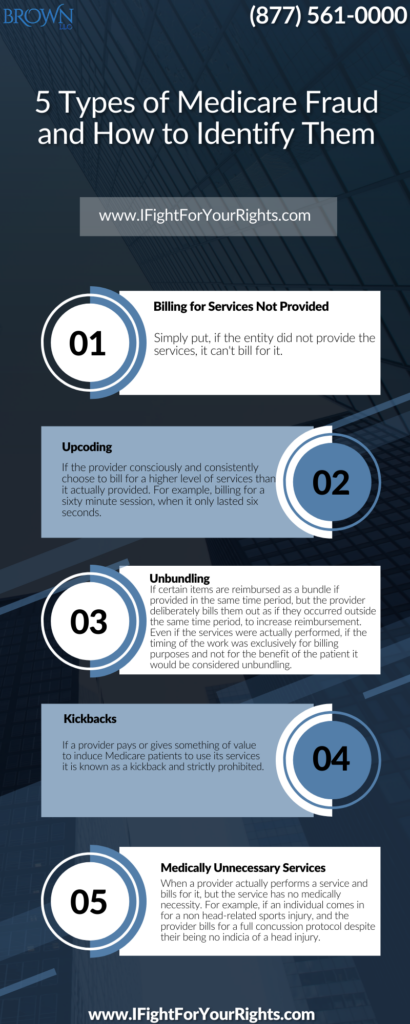5 Types of Medicare Fraud and How to Identify Them
As healthcare costs continue to grow, Medicare and Medicaid are two government programs that have become essential in providing care for millions of Americans. However, with the vast amounts of money involved, Medicare and Medicaid fraud has become increasingly prevalent. What is Medicare fraud? Medicare fraud occurs when an individual provider, hospital, or other practice intentionally bills Medicare for services that were not provided, overcharges for services, or otherwise submits false claims for payment. Medicaid fraud is similar but refers specifically to fraudulent activities related to the Medicaid program. The following are some of the most common types of Medicare and Medicaid fraud, as well as tips on how to identify them. Since Medicare Fraud and Medicaid Fraud are both frauds against the government, it is critical for a Medicare whistleblower to be able to identify the types of fraud to put an end to it, by potentially filing a Medicare fraud whistleblower claim under the False Claims Act.
 Possible Medicare Fraud and Abuse Include:
Possible Medicare Fraud and Abuse Include:
Billing for services not provided
One of the most common types of Medicare fraud is billing for services that were not provided. This can occur when a healthcare provider submits claims for services that were never performed or for equipment that was never provided or delivered to the patient. This type of fraud can be difficult to detect, as the patient may not check what services were billed to his or her insurance, and the provider may falsely document the service. One red flag for this type of fraud is if you receive a bill for a service or piece of equipment that you simply do not recall receiving.
Upcoding
Upcoding is another common form of Medicare fraud. This occurs when a healthcare provider bills for a more expensive service than was actually provided. For example, if a patient receives a routine office visit that lasts only a few minutes, but the provider bills for a more complex visit that requires more time, resources and a more demanding evaluation, this would be considered upcoding.
Speak with the Lawyers at Brown, LLC Today!
Over 100 million in judgments and settlements trials in state and federal courts. We fight for maximum damage and results.
Unbundling
Unbundling occurs when a provider bills separately for services that should be billed together. Under Medicare and Medicaid regulations, certain services must be billed using a single procedure code. For example, if a provider bills for an office visit and a brief phone call on the same day as two separate charges instead of billing for them as a single charge, if the regulations call for these items to be billed as one bundle, but the provider separates them by date of service or procedure code, this would be considered unbundling.
Kickbacks
Kickbacks occur when a provider receives payment or other benefits in exchange for referring patients to a specific facility or provider, which is considered Medicare fraud. For example, a provider receives a kickback from a laboratory in exchange for referring patients for testing. This type of fraud can be difficult to identify, but one red flag is if a provider consistently refers patients to the same facility that pays the provider or is owned by the provider.
Medically Unnecessary Services
When a provider submits a claim for services that were not medically necessary, it is also an example of Medicare or Medicaid Fraud. For example, if a provider bills for a diagnostic test, surgical procedure, or other service that the patient did not need or without a valid physician order, this would be considered a false claim.

